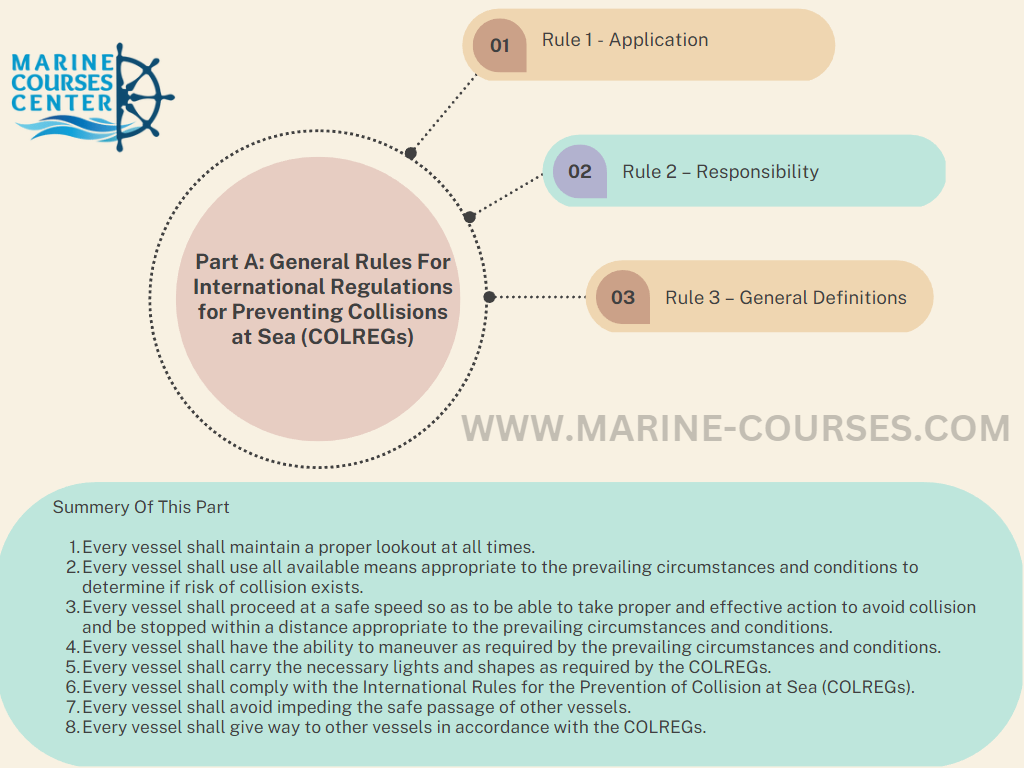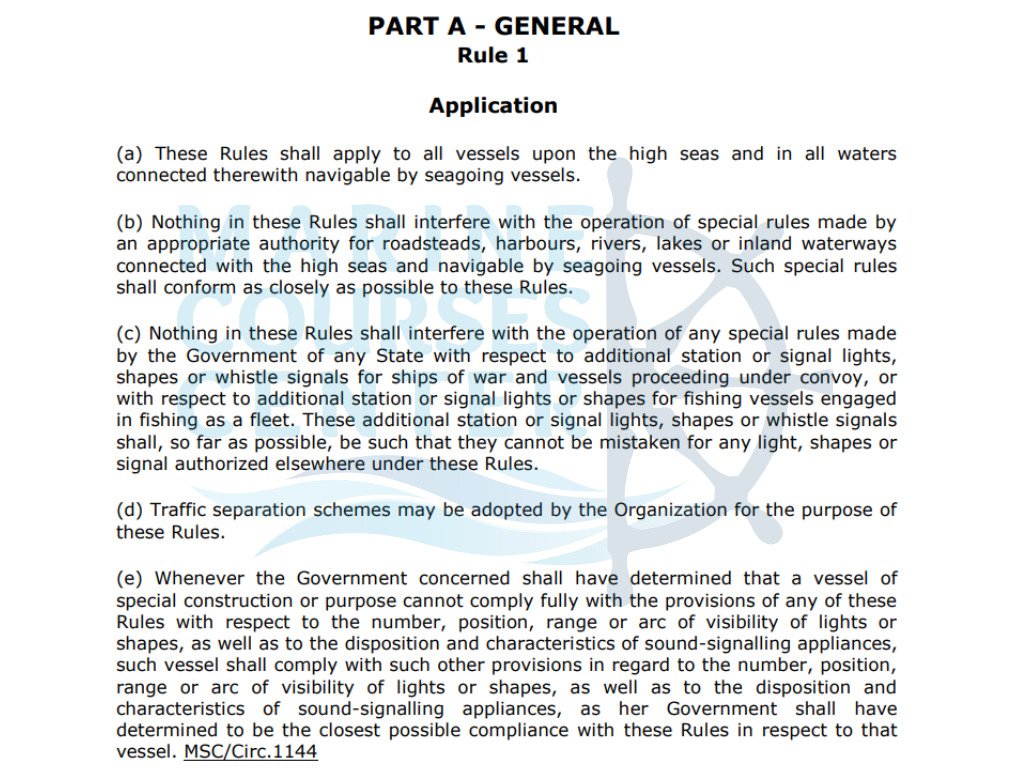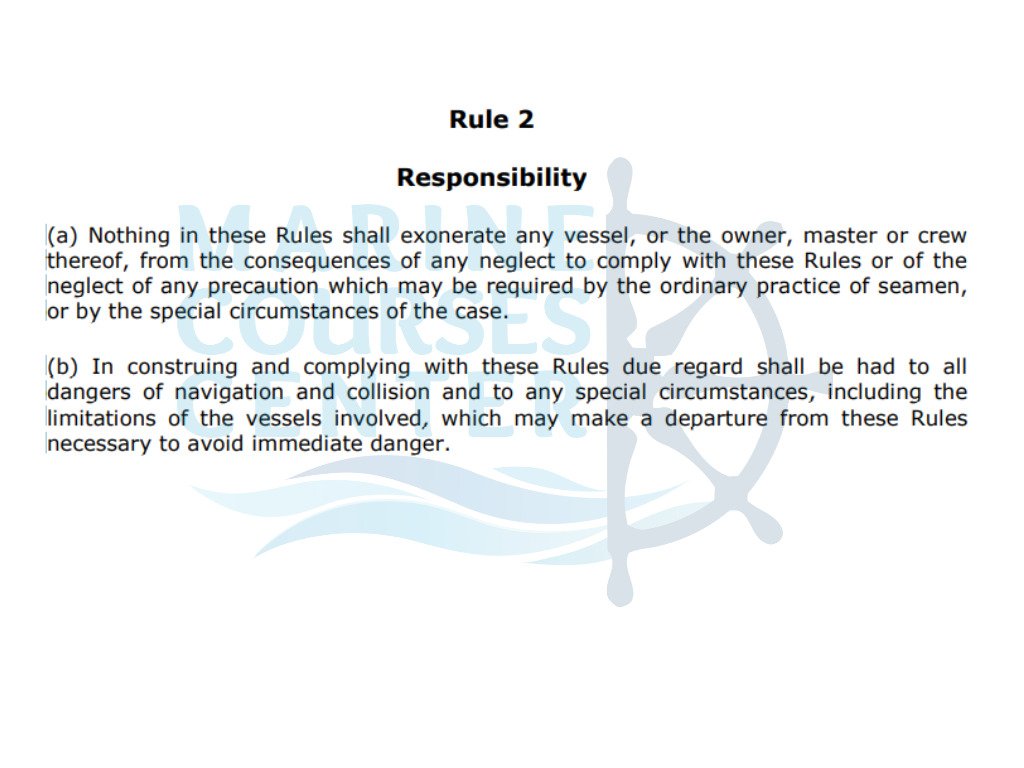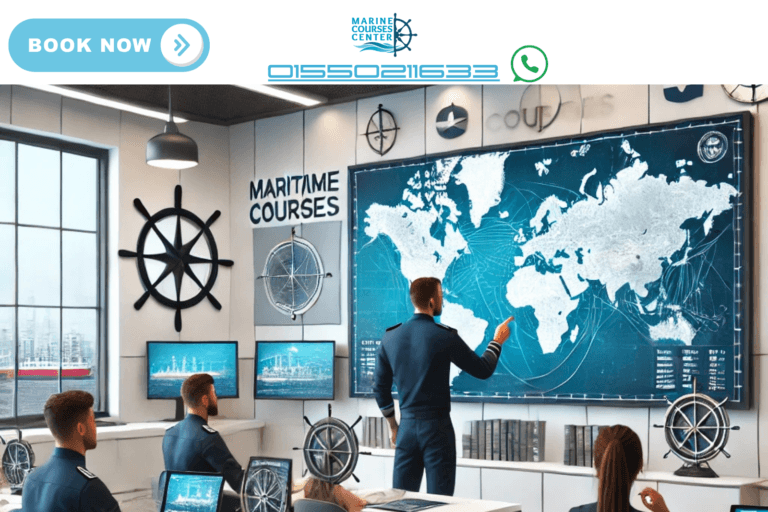
Rule 1 Application Part A: General Rules For International Regulations for Preventing Collisions at Sea (COLREGs)
Table of Contents

Lets to sum up Rule 1 Application Part A: General Rules For International Regulations for Preventing Collisions at Sea (COLREGs) in 10 points
- These rules apply to all vessels on the high seas and in all waters navigable by seagoing vessels.
- These rules do not interfere with the operation of special rules made by an appropriate authority for certain bodies of water.
- These rules do not interfere with the operation of any special rules made by a government for additional signals for ships of war and vessels in convoy, or for fishing vessels engaged in fishing as a fleet.
- Traffic separation schemes may be adopted by the International Maritime Organization (IMO) for the purpose of these rules.
- If a vessel of special construction or purpose cannot comply fully with the provisions of these rules, the vessel shall comply with the closest possible alternative provisions as determined by the government.
- Special rules for roadsteads, harbors, rivers, lakes or inland waterways connected with the high seas and navigable by seagoing vessels should conform as closely as possible to the COLREGs.
- Additional station or signal lights, shapes or whistle signals for ships of war and vessels proceeding under convoy should conform as closely as possible to the COLREGs.
- Special rules for fishing vessels engaged in fishing as a fleet should conform as closely as possible to the COLREGs.
- Special Rules made by the Government of any State should conform as closely as possible to the COLREGs.
- The vessels of special construction or purpose should comply with the closest possible alternative provisions as determined by the government in order to comply with the COLREGs.
Q: What are the u003ca href=u0022https://azure-fish-539696.hostingersite.com/2023/01/international-regulations-for-preventing-collisions-at-sea-colreg.htmlu0022 data-type=u0022URLu0022 data-id=u0022https://azure-fish-539696.hostingersite.com/2023/01/international-regulations-for-preventing-collisions-at-sea-colreg.htmlu0022u003eCOLREGsu003c/au003e and where do they apply?
A: The COLREGs, or International Regulations for Preventing Collisions at Sea, apply to all vessels upon the high seas and in all waters connected therewith navigable by seagoing vessels.
Q: How do the u003ca href=u0022https://azure-fish-539696.hostingersite.com/2023/01/international-regulations-for-preventing-collisions-at-sea-colreg.htmlu0022 target=u0022_blanku0022 data-type=u0022URLu0022 data-id=u0022https://azure-fish-539696.hostingersite.com/2023/01/international-regulations-for-preventing-collisions-at-sea-colreg.htmlu0022 rel=u0022noreferrer noopeneru0022u003eCOLREGs u003c/au003eapply to special rules made by an appropriate authority for roadsteads, harbours, rivers, lakes, or inland waterways?
A: The COLREGs do not interfere with the operation of special rules made by an appropriate authority for these types of waters, as long as they conform as closely as possible to the COLREGs.
Q: How do the u003ca href=u0022https://azure-fish-539696.hostingersite.com/2023/01/international-regulations-for-preventing-collisions-at-sea-colreg.htmlu0022 target=u0022_blanku0022 data-type=u0022URLu0022 data-id=u0022https://azure-fish-539696.hostingersite.com/2023/01/international-regulations-for-preventing-collisions-at-sea-colreg.htmlu0022 rel=u0022noreferrer noopeneru0022u003eCOLREGs u003c/au003eapply to special rules made by the Government of any State with respect to additional station or signal lights, shapes, or whistle signals for ships of war and vessels proceeding under convoy, or with respect to additional station or signal lights or shapes for fishing vessels engaged in fishing as a fleet?
A: The COLREGs do not interfere with the operation of any special rules made by the Government of any State with respect to these types of vessels, as long as the additional station or signal lights, shapes, or whistle signals cannot be mistaken for any lights, shapes, or signals authorized elsewhere under the COLREGs.
Q: Can traffic separation schemes be adopted by the Organization for the purpose of the u003ca href=u0022https://azure-fish-539696.hostingersite.com/2023/01/international-regulations-for-preventing-collisions-at-sea-colreg.htmlu0022 target=u0022_blanku0022 data-type=u0022URLu0022 data-id=u0022https://azure-fish-539696.hostingersite.com/2023/01/international-regulations-for-preventing-collisions-at-sea-colreg.htmlu0022 rel=u0022noreferrer noopeneru0022u003eCOLREGsu003c/au003e?
A: Yes, traffic separation schemes may be adopted by the Organization for the purpose of the COLREGs.
Q: What should a vessel do if it cannot comply fully with the provisions of any of the u003ca href=u0022https://azure-fish-539696.hostingersite.com/2023/01/international-regulations-for-preventing-collisions-at-sea-colreg.htmlu0022 target=u0022_blanku0022 data-type=u0022URLu0022 data-id=u0022https://azure-fish-539696.hostingersite.com/2023/01/international-regulations-for-preventing-collisions-at-sea-colreg.htmlu0022 rel=u0022noreferrer noopeneru0022u003eCOLREGs u003c/au003ewith respect to the number, position, range or arc of visibility of lights or shapes, as well as to the disposition and characteristics of sound-signalling appliances?
A: If a vessel of special construction or purpose cannot comply fully with the provisions of any of the COLREGs, it should comply with other provisions in regard to the number, position, range or arc of visibility of lights or shapes, as well as to the disposition and characteristics of sound-signalling appliances as her Government shall have determined to be the closest possible compliance with the COLREGs.
Rule 2 Responsibility Part A: General Rules For International Regulations for Preventing Collisions at Sea (COLREGs)

Lets to sum up Rule 2 Responsibility Part A: General Rules For International Regulations for Preventing Collisions at Sea (COLREGs)
- These Rules do not excuse vessels or their owners, masters, or crews from any consequences of neglecting to comply with them or of neglecting any necessary precautions.
- The Rules must be interpreted and followed with consideration for all potential navigation and collision dangers and any special circumstances, such as the limitations of the vessels involved.
- Departures from the Rules may be necessary to avoid immediate danger.
- Vessels and their crew members have a responsibility to comply with the Rules in order to avoid danger and accidents.
- These Rules are not a substitute for a ship master’s judgement, but should be used as a guide for safe navigation.
- Compliance with these Rules is mandatory in order to avoid danger and accidents.
- The safety of the ship and lives of people on board are the primary concern.
- The rules are intended to prevent collisions by setting out a system of navigation lights and shapes.
- The rules can be modified by the government in certain situations.
- Compliance with these Rules is important to maintain safety on the high seas and navigable waters.
What does rule 2 state regarding the responsibility of vessels and their owners, masters, and crew?
Rule 2 states that nothing in these Rules shall exonerate any vessel, or the owner, master or crew thereof, from the consequences of any neglect to comply with these Rules or of the neglect of any precaution which may be required by the ordinary practice of seamen, or by the special circumstances of the case.
Can a vessel be excused from the consequences of not complying with these Rules?
No, according to rule 2, nothing in these Rules shall exonerate any vessel, or the owner, master or crew thereof, from the consequences of any neglect to comply with these Rules.
What should be taken into consideration when construing and complying with these Rules?
According to rule 2, due regard shall be had to all dangers of navigation and collision and to any special circumstances, including the limitations of the vessels involved, when construing and complying with these Rules.
In what situations may a departure from these Rules be necessary?
A departure from these Rules may be necessary to avoid immediate danger, in situations such as special circumstances, including the limitations of the vessels involved, according to rule 2.
Who is responsible for ensuring compliance with these Rules?
According to rule 2, the vessel, owner, master, and crew are all responsible for ensuring compliance with these Rules.
Does rule 2 allow for exceptions to be made when complying with these Rules?
Yes, according to rule 2, due regard shall be had to all dangers of navigation and collision and to any special circumstances, including the limitations of the vessels involved, which may make a departure from these Rules necessary to avoid immediate danger.
How should the rules be applied and interpreted on a vessel?
(a) The rules should be applied and interpreted with due regard to all dangers of navigation and collision and any special circumstances, including the limitations of the vessels involved, that may make a departure from the rules necessary to avoid immediate danger.
Can a vessel or its owner, master, or crew be held responsible for a collision?
a) Yes, they can be held responsible for any neglect to comply with the rules or for neglecting any precautions that may be required by the ordinary practice of seamen or by the special circumstances of the case.
What should be taken into consideration when applying the rules on a vessel?
Dangers of navigation and collision, any special circumstances, and the limitations of the vessels involved should be taken into consideration when applying the rules on a vessel.
Can the rules be ignored in emergency situations?
Yes, if necessary to avoid immediate danger, a departure from the rules may be made.
What are the consequences of neglecting the rules or precautions on a vessel?
Neglecting the rules or precautions on a vessel can lead to consequences such as collisions, injury, and damage to the vessel.
What is the purpose of Rule 2-Responsibilities?
The purpose of Rule 2-Responsibilities is to ensure that all parties involved in the operation of a vessel take responsibility for their actions and decisions, and to take into consideration all dangers and special circumstances when applying and interpreting the rules.



1 Comment